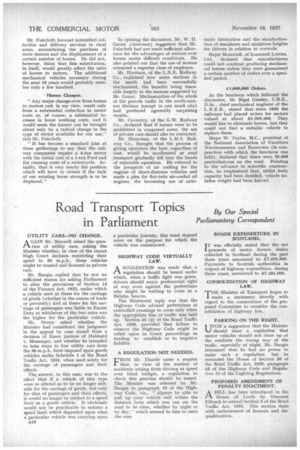Mr. Faircloth forecast intensified collection and delivery services in rural
Page 18

If you've noticed an error in this article please click here to report it so we can fix it.
areas, necessitating the purchase of more motors and the displacement of a certain number of horses. He did not, however, think that this substitution, in itself, would greatly affect the ratio of horses to motors. The additional mechanical vehicles necessary during the next 10 years would probably number only a few hundred.
Horses Cheaper.
" Any major change-over from horses to motors ca4, in my view, result only from a substantial reduction in motor costs or, of course, a substantial increase in horse working costs, and it would seem the former can be brought about only by a radical change in the type of motor available for our use," said Mr. Faircloth.
" It has become a standard joke at these gatherings to say that the railway companies require a 4-ton motor with the initial cost of a 1-ton Ford and the running costs of a motorcycle. Actually, that is very nearly the position which will have to obtain if the bulk of our existing horse strength is to be displaced." In opening the discussion, Mr. W. H. Gaunt (chairman) suggested that Mr. Faircloth had not made sufficient allowance for the advantages of motors over horses under difficult conditions. He also pointed out that the use of motors attracted a superior class of employee.
Mr. Harrison, of the L.N.E. Railway Co., explained how some stations in the north had been successfully mechanized, the benefits being traceable largely to the reasons suggested by Mr. Gaunt. Mechanization of the whole of the parcels traffic in the north-eastern division (except in one small city) had produced agreeably surprising results.
Mr. Coventry, of the G.W. Railway Co., declared that if horses were to be prohibited in congested areas, the use of private cars should also be restricted.
Mr. Shearman, of the L.M.S. Railway Co., thought that the process of giving operators the best, regardless of cost, would be accelerated as road transport gradually fell into the hands of reputable operators. He referred to the prospects of air cooling for the engines of short-distance vehicles and made a plea for flat-twin air-cooled oil engines, the increasing use of auto
matic lubrication and the standardization of maximum and minimum heights for drivers in relation to controls.
Major Moncrieff, of Scammell Lorries, Ltd., declared that manufacturers could not continue producing mechanical horses unless they were guaranteed a certain number of orders over a specified period.
1,000,000 Orders.
At the luncheon which followed the discussion, Sir Nigel Gresley, C.B.E., D.Sc., chief mechanical engineer of the L.N.E.R., stated that since 1935 the railways had placed orders for motors valued at about £1,000,000. They would like to eliminate horses, but they could not find a suitable vehicle to replace them.
Major W. Taylor, M.C., president of the National Association of Furniture Warehousemen and Removers (in conjunction with which the luncheon was held), declared that there were 20,000 pantechnicons on the road. Pointing to the advance in scientific construction, he emphasized that, whilst body capacity had been doubled, vehicle unladen weight had been halved.




























